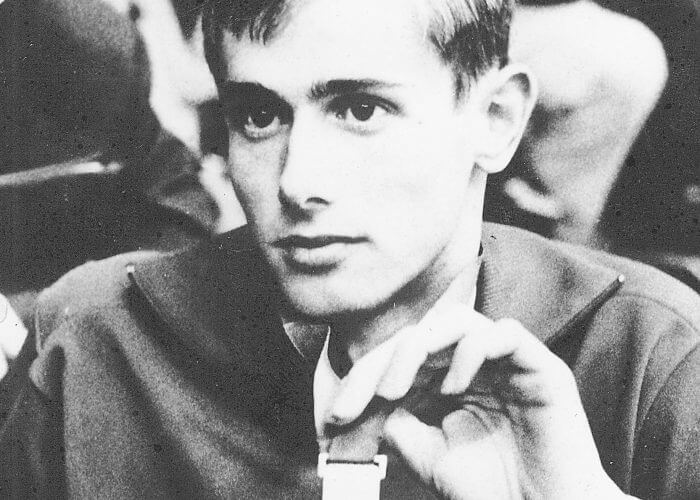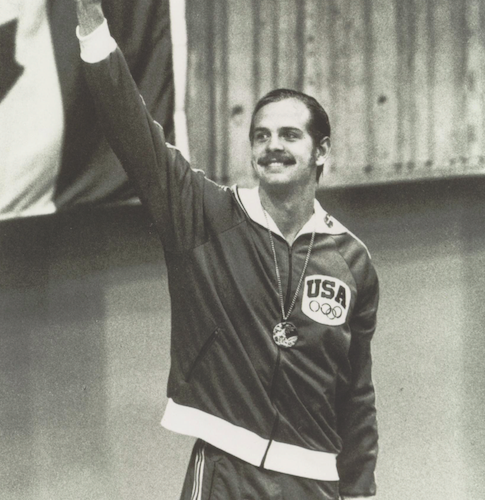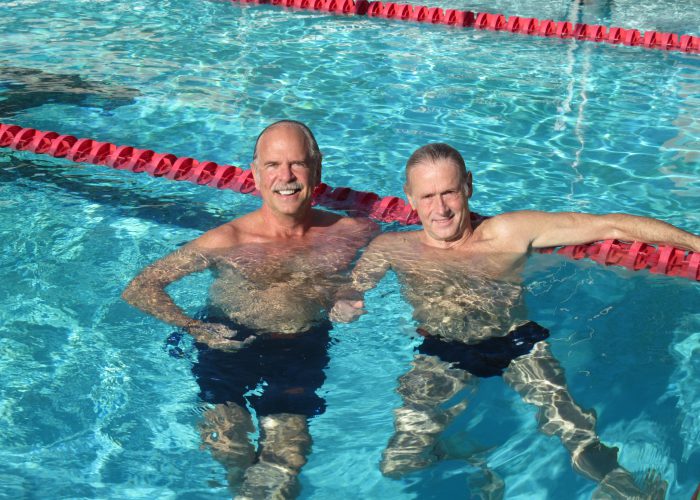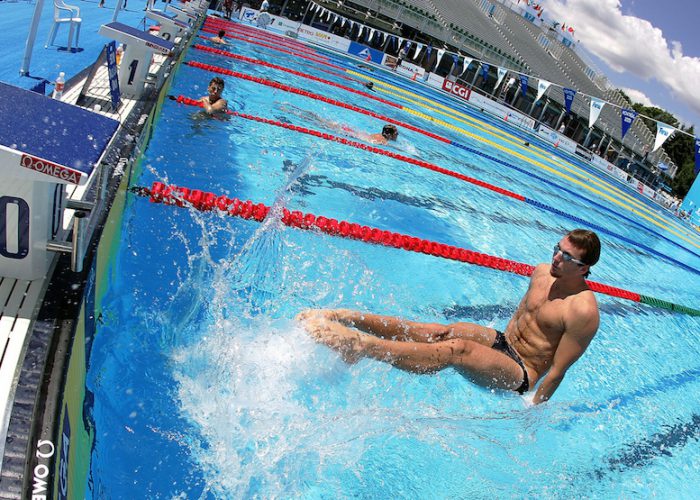League of Olympic Swim Legends: Roland Matthes Tops 200 Back Podium With Peirsol & Naber

What would have unfolded had Tokyo 2020 gone ahead as planned this week – and where would it all have fit in the thread of Olympic swim legends and pioneers like Roland Matthes, Aaron Peirsol and John Naber ? To mark the eight days over which the Tokyo 2020 Olympic Games would have unfolded had the coronavirus pandemic not forced postponement, the team at Swimming World is filling the void with a Virtual Vision Form Guide and League of Olympic Swimming Legends.
Day 6, event 2 – The Rolls-Royce of Backstroke Goes Back-to-Back

Roland Matthes – Photo Courtesy: International Swimming Hall of Fame (ISHOF)
Men’s 200m Backstroke
The Podium
- Roland Matthes (GDR)
- Aaron Peirsol (USA)
- John Naber (USA)
The Other Finalists (Listed Alphabetically):
- Adolf Kiefer (USA)
- Lenny Krayzelburg (USA)
- Ryan Lochte (USA)
- Got Poliansky (URS)
- Martin Lopez Zubero (ESP)
- Our Lane 9* place goes – with a nod to American Jed Graef, the only other missing from our top eight who won the crown in Olympic-record time (1964) – to the 2012 Champion, who defeated the 2008 Champion and topped his time with what was a World textile best and might have been a World record had it not been for the effects of shiny suits. We will never know but we grant our lane-9er a place in the all-time line-up to note that he belongs in that company and kept a USA tradition alive and kicking:
- Tyler Clary (USA)
* – in our series, we will use Lane 9 to add an athlete whose story reflects extraordinary situations of different kinds, including being deprived by those who fell foul of anti-doping rules or by political decisions or, indeed the Olympic program, as well as simple facts such as “he/she was the only other title winner who claimed gold in a WR but didn’t make out top 8 on points”
All-Time Battle Of Olympic Swim Legends Goes To Roland Matthes

Aaron Peirsol

John Naber – Photo Courtesy: Bob Ingram
Earlier in the week, East Germany’s Roland Matthes and the United States’ Aaron Peirsol clashed in a spectacular duel in the 100 backstroke. Well, one showdown was not enough for the backstroke stars as they again posted a gold-silver finish, this time in the 200 backstroke. Once again, it was Matthes, a star of the 1960s and 1970s, who squeezed out the win.
Matthes knew no peer during the prime years of his career. He set the first of his nine world records in the event in 1967 and followed a year later by securing his first Olympic crown. By the time the 1972 Olympic rolled around, Matthes seemed unbeatable, and he backed up that belief by setting a world record of 2:02.82 to win gold. The next summer, he took the world record down to 2:01.87 at the inaugural World Championships.
Peirsol’s career was sterling in its own right, as he broke out at the 2000 Olympics in Sydney with a silver medal in the 200 backstroke. He was the world champion by the next year and became an Olympic champion in 2004 when he won the 100 backstroke and 200 backstroke. A silver medal behind Ryan Lochte in 2008 marked the third straight Games in which Peirsol, who set seven world records in the event, medaled in the 200 back.
American John Naber, the star of the United States’ 1976 Super Squad, is the Legends bronze medalist. Naber won four golds and a silver at the 1976 Olympics in Montreal, including a title in the 200 backstroke. In that event, Naber was timed in 1:59.19 to become the first person under two minutes, with the record lasting seven years.
Roland Matthes – What Dominance Looked Like (100m), 1968
The Rolls-Royce Of Swimming, Matthes Thunders Home

Later in life: John Naber and Roland Matthes – Photo Courtesy: John Naber
1972 Munich – Men 200m Backstroke – Athletes: 36 Nations: 25
- 2:02.82wr Roland Matthes GDR
- 2:04.09 Michael Stamm USA
- 2:04.33 Mitchell Ivey USA
2:07.29 Igor Grivennikov URS
2:08.67 Lutz Wanja GDR
2:10.09 Jurgen Kruger GDR
2:11.77 Tadashi Honda JPN
Date of final: September 2, 1972
Roland Matthes (GDR) gave warning of what was to come when, aged 16, on March 23, 1967 in Magdeburg, he broke his first two European records, of 59.8sec (the first European to race inside the minute) in the 100m backstroke, on his way to a 2:11.2 over 200m. On September 21 the same year, he set his first world record, shaving 0.7sec off American Charles Hickcox’s 100m global mark, in 58.4, and then, on November 8, just shy of his 17th birthday, he inflicted another wound on the same swimmer by carving 1.5sec off the world 200m record, in 2:07.9. Matthes would not be beaten in an international backstroke race until 1974 and remains the greatest backstroke swimmer in history.
In the four years in between claiming the 100m and 200m titles at the 1968 Games in Mexico and the opening of events at the 1972 Games in Munich, Matthes had improved the world record in the 100m four times and in the 200m five times.
Four days after retaining the 100m crown, Matthes claimed the double for a second time. Michael Stamm (USA), second in the 100m final, broke Matthes’s Olympic record in 2:07.51 in the second heat, before the defending champion responded with a 2:06.62 in the fifth heat. In the final, Matthes followed a well-worn path, letting his rivals set the pace down the first length – but only just: Mitch Ivey* (USA), fourth in the 100m, turned first in 28.29, with Stamm on 28.68 and Matthes on 28.85.
At 100m, Ivey maintained the lead, in 59.34, Matthes having inched ahead of Stamm, 59.96 to 1:00.5. From there, the East German was the fastest, first at the last turn in 1:30.96, 0.46sec up on Ivey, with Stamm 0.6sec further adrift. By the close, Matthes had hammered home a world record of 2:02.82 (the standard declared an equal world record because the 2:02.8 at which the East German had set the mark was registered manually), leaving Stamm and Ivey to collect the minor medals more than a second behind the gold standard.
Behind the medal winners, the race was a fascinating mix of stars from non-backstroke events: in fourth place was Brad Cooper (AUS), Olympic 400m freestyle champion, and behind him Tim McKee, who was granted silver in the most controversial 400m medley final in history.
Matthes’s achievement of retaining both the 100m and 200m crowns had not been matched by the dawn of 2008. Before Beijing 2008, only three men had ever retained a backstroke title: Warren Paoa Keoloha (USA, 1920-1924, 100m), David Theile (AUS, 1956-1960, 100m) and Matthes (both 100m and 200m).
The East German’s claim to being the greatest backstroke swimmer in history includes the following accolades: he retained both the 100m and 200m Olympic titles (1968-72), the only swimmer ever to do so, he won three world titles (100m and 200m, 1973 and 100m, 1975), retained the European titles in both events (1970, 1974) and established 16 world records over the 100m (7) and 200m (9) events between 1967 and 1975. He also helped medley teammates to claim the only two relay world records to fall to East German men.
Secret-police documents would later reveal a state-doping programme had been behind the GDR success story of the 1970s and 1980s. However, in a 2006 confession, Dr Helge Pfeiffer, one of the senior sports scientists who knew about the doping programme, revealed that Matthes’s coach, Marlies Grohe-Geissler, was the only GDR coach for whom refusal to comply with the Stasi-run drugs regime did not mean instant dismissal. Grohe-Geissler maintained her strong opposition to the use of performance-enhancing substances and after Matthes had retired did not figure highly in the GDR regime that took women’s swimming by storm from 1973 onwards.
Roland Matthes passed away in December 2019, aged 69.
Another great Olympic battle over 200m backstroke
Aaron Peirsol – In A League Of His Own – Plus, Gold Lost & Then Quickly Regained

Aaron Peirsol practices for another fine start in the midst of a brilliant career – by Patrick B. Kraemer ©
2004 Athens – Men 200m Backstroke – Athletes: 36 Nations: 30
- 1:54.95or Aaron Peirsol USA
- 1:57.35 Markus Rogan AUT
- 1:57.56 Razvan Florea ROM
1:57.76 James Goddard GBR
1:58.40 Tomomi Morita JPN
1:58.49 Simon Dufour FRA
1:59.28 Gregor Tait GBR
2:00.06 Blaz Medvesek SLO
Date of final: August 19, 2004
Between 2000, when a 17-year-old American claimed the silver medal in the Olympic 200m backstroke final won by teammate Lenny Krayzelburg, and the opening of the Games in Athens 2004, Aaron Peirsol, coached by Eddie Reese at Texas Longhorns in his college days and beyond, had matured into the fastest backstroke specialist the world had ever known.
World 200m champion in 2001 and double world champion in 2003 (100m and 200m), he had lowered the world record in the 200m twice. There was much more to come in the years ahead.
In Athens, there was drama and a heart-stopping moment at the end of the 200m final that unfolded hree days after Peirsol had won the 100m title.
By the end of the four lengths of racing, there was no question who the winner was: Peirsol had turned first throughout, in 27.17, 56.15 and 1:25.30 before stopping the clock in an Olympic record of 1:54.95, 2.40sec ahead of Markus Rogan (AUT), who won a boiling battle for the three places after the champion.
James Goddard (GBR) had raced with Peirsol for 50m, was half a second down but in second at 100m, was still in second at 150m, with Rogan only 0.1sec adrift. The British challenger was alongside Rogan with 5m to go before visibly tightening from the fatigue of a blistering race that started with a 27.18sec split. Goddard came under pressure from a fast-finishing Razvan Florea (ROM), whose 29.96 split was second only to Peirsol’s down the last length. Rogan claimed silver 0.21 ahead of Florea, with Goddard locked out by 0.2.
Then the drama began in earnest.
A “DSQ” appeared on the scoreboard next to Peirsol’s name, promoting Rogan to gold, Florea to silver and Goddard to the podium. The allegation was that the American had rolled on his front too early at the third turn. That had forced him to engage in a prolonged freestyle kick into the wall and thus breach the rule that states the backstroke turning action must be “one continuous motion”.
However, the paperwork submitted by Woon Sui-Kut, the chief referee on the night, was nothing short of unintelligible, according to FINA. It was decided almost instantly that the disqualification could not stand because the paperwork from the lane judge and chief judge would not have held up under the scrutiny of protest.
Reese told reporters after the decision was reversed:
“We did keep looking for ‘just kidding’ to come up on the scoreboard.”
Rogan, whose time was slower than the Commonwealth record of 1:57.25 established by Goddard in the semi-final, said:
“I might have been the shortest Olympic champion in history. It was in my head for a second but never in my heart.”
He praised Goddard as “a great swimmer” but said: “His best time would have beaten me – but that’s the Olympics.”
FINA reinstated Peirsol but issued a statement saying:
“Fina received a written protest from the Amateur Swimming Federation of Great Britain (ASFGB) and Austrian Swimming Federation (VOS) regarding the re-instating of the swimmer Aaron Peirsol (USA) after his disqualification in the 200 metres backstroke event at the Olympic Games Athens 2004. The Jury of Appeal heard the Referee and the Fina Technical Swimming Commission after which the Jury of Appeal unanimously decided to reject the protest of ASFGB and VOS as the report of the referee did not show any violation of the Fina swimming rules by the swimmer Aaron Peirsol.”
The next day, the three judges at the heart of the dispute were dismissed from the Olympic Games. Woon Sui-Kut, of Singapore, Felix Mikhailov, of Russia, and Denis Cadon, the president of French swimming judges, refused to acknowledge that they had made a mistake.
The Athens 2004 Olympic 200m backstroke final:



